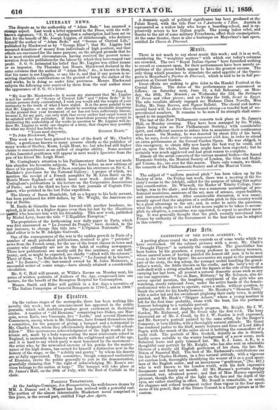• LITERARY NEWS.
The dispute as to the authorship of " Adam Bede " has assumed a -strange aspect. Last week a letter appeared in the Times, with the well- bsown signature, " S. G. O.," stating that a subscription 'had been set on foot for the benefit of Mr. Joseph Liggins, of Attleborough, who declares himself the author of "Adam Bede," and "Scenes of Clerical Life," published by Blackwood as by " George Eliot "; that Mr. Liggins had accepted donations of money from individuals of high position, and that others are canvassed for the same purpose, on the alleged grounds that he is in most straitened circumstances, having received the poorest remu- neration from his publishers for the labour by which they have reaped vast profit. S. G. 0. intimated his belief that Mr. Liggins was either insane or an impostor. On Thursday last Messrs. Blackwood declared in the same columns that the author of "Adam Bede," &c., is known to them, that his name is not Liggins, or any like it, and that if any person is re- ceiving charitable contributions on the ground of being the author of the said works, he is doing so under false pretences. Messrs. Blackwood subjoin the following note received by them from the real author since the appearance of S. G. 0.'s letter. " Tune 4.
"My dear Mr. Blackwood—As it seems my statement that Mr. Liggins is not the author of "Scenes of Clerical Life" and "Adam Bede" is by certain persons flatly contradicted, I wish you would add the weight of your testimony to the truth of what I have stated. It is the more painful to me that Mr. Li s, or any one else should be receiving charitable donations on the ground that your treatment of me has not been sufficiently liberal, because I, for my part, can only wish that every author had equal reason to be satisfied with his publisher, If those benevolent persons who persist in attributing the authorship of the works in question to Mr. Liggins will in- duce Mr. Liggins to write one chapter of a story, that chapter may possibly do what my denial has failed to do.
"Yours most sincerely, GEORGE ELIOT." " To John Blackwood, Esq."
This week we have been grieved to hear of the death of Mr. Charles Oilier, a gentleman known to many persons chiefly as the publisher of many works of Shelley, Keats, Leigh Hunt, &c. but who had still higher claims to remembrance as an author of singular ability. Some account of this lamented gentlemen will appear in next week's Spectator from the pen of his friend Mr. Leigh Hunt.
Mr. Coningham's attention to his Parliamentary duties has not made him abandon his favourite subjects. We have before us new editions of three of his pamphlets. One of them contains his strictures on Sir C. L. Eastlake's purchases for the National Gallery; b propos of which, we mention the receipt of a French pamphlet by M. Leon Bette on the Morris Moore Raphael—of which more next week. Another of Mr. Coningham's publications is his lecture on the Cooperative Associations of Peril' ; and in the third we have the last journals of Captain Fitz- james, who perished in the lost Polar expedition.
The library of Baron Humboldt, left as a legacy to his body servant, has been purchased for 4000 dollars, by Mr. Wright, the American en- voy at Berlin.
M. Emile-de Girardin has come forward with another brochure, in- spired, it. lb said, in a higher degree even than his last by the illustrious -r-meson who honours him with his friendship. This new work, published by Michel Levy, bears the title " L'Equilibre Europeen."
The proprietors of the forthcoming new daily paper in Paris, which was first announced as " Le Journal du Purple," have decided, in the last instance, to change this title into " L'Opinion Nationale." The chief editor is to be M. Adolphe Gueroult.
One of the consequences of the war is the sudden growth in Paris of a number of small periodical publications, destined to give " patriotic" news from the French army, for the use of the lower rinses in town and country who ordinarily are not in the habit of reading newspapers. These new publications are mostly sold for five centimes, or one half- penny, and, as might be expected, are chiefly "edited with the scissors." Three of them, "Le Bulletin de la Guerre, Le Journal de la Guerre," and " Le Zouave,"—the last-named owned by M. Jules Moineaux, a successful writer of comic songs,—have already attained a considerable circulation.
Mr. S. C. Hall will present, at Willis's Rooms on Monday next, his series of written portraits of Authors of the Age, compressed into one lecture, for the benefit of the Brompton Hospital for Consumption.
Messrs. Smith and Elder will publish in a few days a narrative of " The Italian Campaigns of General Bonaparte in 1796-7, and in 1800."


























 Previous page
Previous page